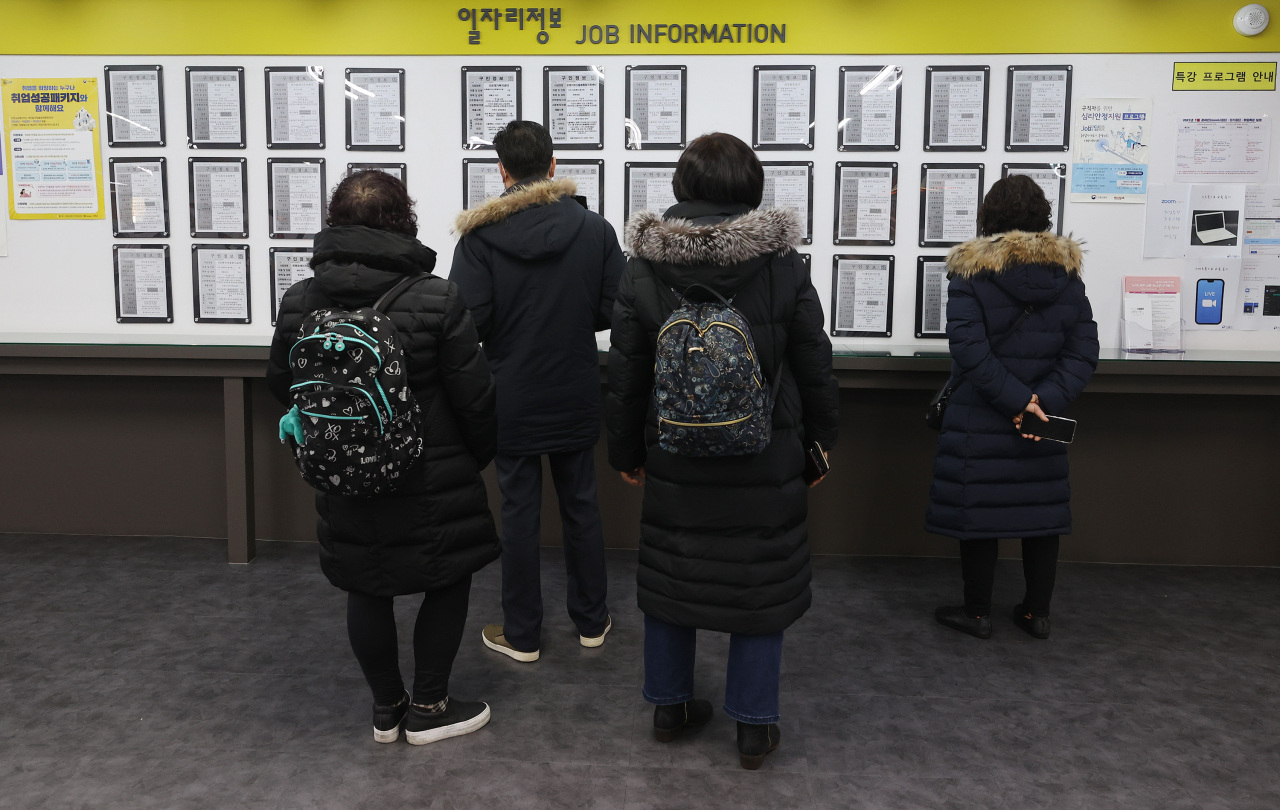South Korean job losses hit 22-year high amid pandemic
By Park Han-naPublished : Jan. 13, 2021 - 17:03

South Korea’s economy last year suffered its worst year for job losses in 22 years, as companies of all sizes struggled to keep employees in the face of the prolonged pandemic, data showed Wednesday.
According to Statistics Korea, the number of employed people here came to 26.9 million last year, down 218,000 from a year earlier, as hotels and restaurants slashed employment. The largest annual job loss on record was 1.27 million jobs in 1998, when the 1997-98 Asian financial crisis took a harsh toll on the country’s economy.
“In light of the pandemic’s lingering impact on the job market and the base effect, the labor market is expected to remain sluggish until February,” Finance Minister Hong Nam-ki said at a government meeting on the economy.
In December, the number of employed people saw the sharpest monthly decrease since February 1999, losing 628,000.
Jeong Dong-myeong, a senior official at Statistics Korea, attributed the fall to job cuts at hotels and restaurants as they were forced to comply with the government’s social distancing rules. The restrictions were elevated to Level 2.5 -- the second-highest in the five-tier system -- in the Seoul metropolitan area in early December after a resurgence of virus cases.
“For the whole year, the face-to-face service sectors suffered larger job losses, and temporary workers, young adults and those in their 30s took a beating,” said Jeong at a press briefing.
All age groups except those aged 60 and over bore the brunt of the job losses.
The ailing labor market is a cause of concern for the government, which forecast the economy would rebound strongly this year on brisk exports and stimulus after its weakest growth in more than two decades in 2020. The Ministry of Economy and Finance expected its real gross domestic product to grow 3.2 percent in 2021 against a contraction of 1.1 percent last year.
Another letdown is the country’s exports, which declined 15.4 percent on-year in the first 10 days of January, according to data from the Korea Customs Service on Monday.
Experts say the outlook for the labor market remains murky.
“Economic indicators of some industries, such as manufacturing and information technology, are showing improvement, but immediate employment actions by the industries are unlikely due to uncertainties stemming from COVID-19,” said Kim So-young, an economist at Seoul National University.
Recovery of the job market will not be seen until the country reaches herd immunity against COVID-19 through vaccination, according to Lee Jong-kwan, a researcher at the Korea Development Institute.
“It will revive in the second half of this year at the earliest, as companies will only be able to resume face-to-face services and people will increase their consumption activities when herd immunity occurs,” he said.
Health authorities here plan to begin vaccine administration for priority groups, including medical workers and residents of eldercare facilities, in late February. Those aged between 19 and 49 can get vaccinated as early as September.
The government is scurrying to carry out job creation projects this year while expanding support for vulnerable groups.
Announcing detailed measures to stabilize employment, the finance minister said that public institutions would hire more than 45 percent of their new employees in the first half of this year.
“The country will hire more than 45 percent of new employees at public institutions in the first half and swiftly begin the process to hire around 22,000 interns this month,” Hong said.
The government also plans to hire 830,000 people for positions created with fiscal spending in the first quarter, and 28,000 people in the social and welfare service sectors.
Seeking to create new jobs in startups focusing on promising technology, the government will secure 3 trillion won ($2.74 billion) in a combination of financing that includes government lending, loan guarantees and investments by 2022 for startups struggling to raise funding due to a lack of collateral.
“It is expected that this scheme will provide funds to about 3,000 startups and create about 20,000 jobs,” Hong said.
To employ a Silicon Valley-inspired venture funding method, the government will seek to revise the Act on the Promotion of Venture Investment within this year to allow lenders to provide low-interest funds to startups in exchange for preemption rights.
By Park Han-na (hnpark@heraldcorp.com)







![[KH Explains] How should Korea adjust its trade defenses against Chinese EVs?](http://res.heraldm.com/phpwas/restmb_idxmake.php?idx=644&simg=/content/image/2024/04/15/20240415050562_0.jpg&u=20240415144419)












![[Today’s K-pop] Stray Kids to return soon: report](http://res.heraldm.com/phpwas/restmb_idxmake.php?idx=642&simg=/content/image/2024/04/16/20240416050713_0.jpg&u=)